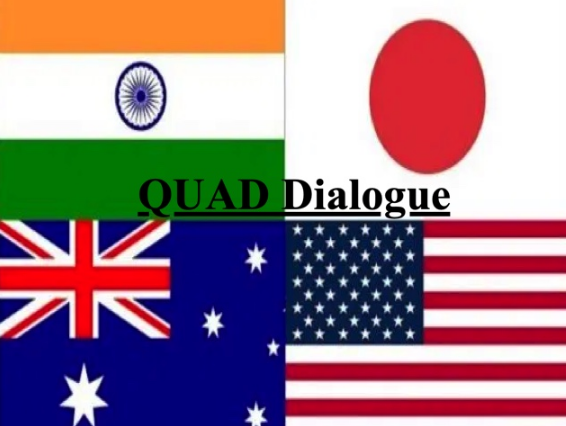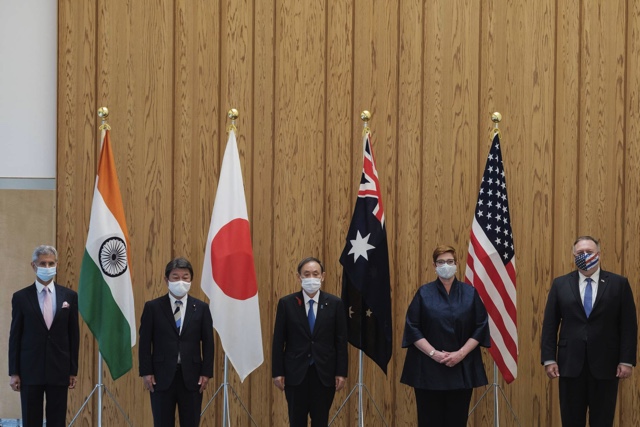The Quadrilateral Security Dialogue (QSD) or Quad Group is an inter-governmental security forum comprising India, Japan, Australia, and the United States of America. In this article, understand the strategic importance of Quad for India.
Read More: केंद्र बनाम दिल्ली सरकार के अधिकार
| Quadrilateral Dialogue was formed in 2007 as four countries— the US, India, Japan and Australia — came together. However, it did not take off initially for a number of reasons and was revived in 2017 after almost a decade due to reasons such as growing convergence among countries, increasing significance of the Indo-Pacific region, rising threat perceptions vis-à-vis China among others.
The conception of QUAD can be traced in the evolution of Malabar Exercise. Malabar actually began as a simple Passage Exercise called as PASSEX in 1992 between the Indian Navies and the U.S. but could not progress further in the wake of 1998 India’s nuclear tests in Pokhran. It then resumed again in 2002. Since 2002, then, QUAD has become an annual feature. It became a trilateral exercise with the addition of Japan in 2015. Since then, QUAD then emerged as a platform for diplomatic consultation and coordination of participant countries who meet regularly at the working- and ministerial levels to discuss mutual interests such as ensuring free, open, and inclusive Indo-Pacific and rules-based international order. To buy our online courses: Click Here The objective of the Quad remains the same-
What is the significance of QUAD for India?
Image Source: The Japan Times India’s involvement as a partner in the Indo-Pacific region can be broadly classified into three groups: the Quad, ASEAN, and Western Indian Ocean. India as a Net Security providerIndia has to be a Net Security Provider in the Indian Ocean Region. For India to assert this role as a Region, its dominance in the IOR needs to be maintained and sustained. QUAD provides India a platform to enhance security through partnership in the region as well as emphasize that its idea of Indo-Pacific stands for a free, open, and inclusive region. Inclusive here means one that includes all countries within the geographical concept as well as others beyond with a stake in it. Countering ChinaThe Quad provides a platform to India to seek cooperation from like-minded countries on various issues such as ensuring respect for territorial integrity and sovereignty and peaceful resolution of disputes. China’s increased aggression in the South China Sea and its likely impact on aggravating regional tension. Quad seeks to check any aggression. Chinese strategy of surrounding India through String of Pearls is a direct challenge to the maritime sovereignty of India and therefore needs to be countered. Framing post-COVID-19 international order: The pandemic has brought a profound transformation globally adversely affecting global supply chains, manufacturing activities and overall economies of countries. QUAD can help India not only to recover from the effects of the pandemic through several integrated and coordinated responses but can also help secure for itself a place in the new world order. One of the first steps taken in 2021 has been enhancing such coordination. The vaccine project will be a good test for QUAD governments to evolve a cooperative structure. Convergence on other issues: India has converging interests with other Quad members on a variety of issues such as connectivity and infrastructure development, security including counter-terrorism; cyber and maritime security; reform of multilateral institutions, etc. ◦ Support from Quad members on these issues can go a long way for India in realizing its strategic and economic goals. Supplementing India’s defense capabilities: Cooperation in the field of defense among Quad members through joint patrols, exchange of strategic information, etc. can help India overcome its imitations related to its naval capabilities, military reconnaissance as well as technology and surveillance capabilities. Ensuring a free Indo Pacific: Indo Pacific must be peaceful, accessible, dynamic, governed by international law and bedrock principles such as freedom of navigation and peaceful resolution of its disputes and that the countries concern should be able to make their own choices and that too without coercion. Counter-terrorism Tabletop Exercise (CT-TTX) for QUAD countries to enhance cooperation and enhance shared capacities to deal with emerging terrorist threats and also assessed CT response mechanisms for the same. What are the underlying challenges?The situation in which QUAD has been revived and especially recent engagements in the form of Malabar Exercise 2020 are seen to be perceived as dominated by a counter-China narrative. In as much as it may look like, there are certain aspects that may not be points of convergence.
Further Prospects
|
About the Author
|





 K Siddhartha is a renowned Civil Services Preparation Mentor and Thought Leader. He has more than 20 years of experience and has mentored over 1550+ civil servants, film personalities, entrepreneurs, and policymakers. Mr. K Siddhartha is the author of 43 books & 116 research articles. He is frequently invited as a speaker on global platforms. (Views are personal)
K Siddhartha is a renowned Civil Services Preparation Mentor and Thought Leader. He has more than 20 years of experience and has mentored over 1550+ civil servants, film personalities, entrepreneurs, and policymakers. Mr. K Siddhartha is the author of 43 books & 116 research articles. He is frequently invited as a speaker on global platforms. (Views are personal)